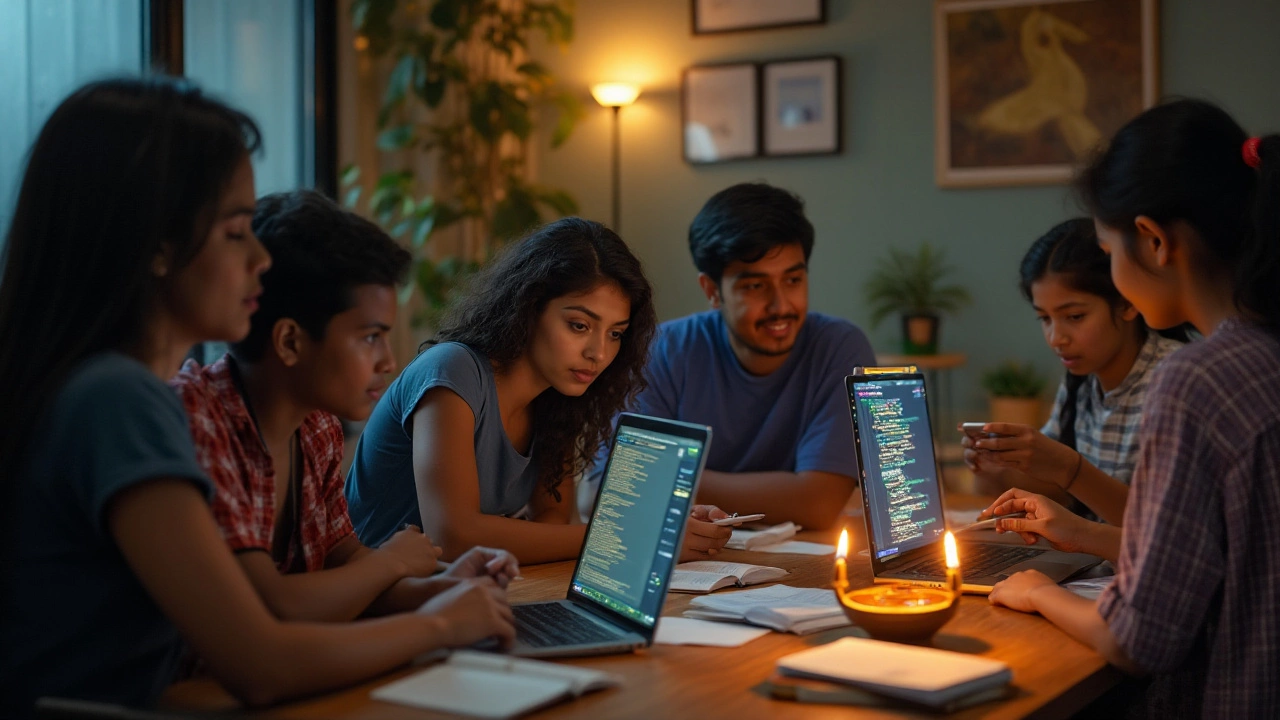Decoding the Challenges: Unraveling the Toughest Lessons in Programming

Learning to code isn't just about memorizing syntax or writing lines of logic. It's a dynamic puzzle, a brainteaser that invites you into a world of creative problem-solving and critical thinking. For many, the hardest challenges in coding often lie beyond the surface-level tasks.
Grasping the abstract, untangling the messy world of debugging, and keeping pace with ever-evolving technologies are just the start of the hurdles one might face. Together, we'll embark on a journey to explore these complexities, offering practical tips and personal insights aimed at making your coding path a bit smoother. Whether you're a newcomer or a seasoned coder brushing up on your skills, understanding these difficulties can transform obstacles into stepping stones.
- Grasping Complex Concepts
- Debugging and Problem Solving
- Staying Updated with Technology
- Managing Frustration and Persistence
- Learning New Languages and Frameworks
- Best Practices for Continuous Improvement
Grasping Complex Concepts
Diving into the world of programming, one quickly realizes that grasping complex concepts is an unavoidable part of the journey. It’s similar to learning a new language, where understanding the nuances isn’t always straightforward. Mathematical logic, algorithms, data structures, and design patterns are some of the most significant hurdles programmers face. For instance, algorithms might appear as intricate pathways in a program’s landscape, demanding not just memorization but also a deep understanding of how to apply them effectively in different scenarios.
Many fledgling coders often struggle with the abstract nature of these concepts. Algorithms involve precise sequences of operations to solve problems, and mastering them requires a strong foundation in mathematics and logic. Coding skills here go beyond knowing the steps; it involves understanding the why behind each approach — why a particular algorithm works best in a given situation, which sometimes means choosing between efficiency and versatility.
The journey is rarely linear or smooth. As highlighted by computer science expert Donald Knuth,
"The process of preparing programs for a digital computer usually requires more time by human beings than that required for their execution by the computer."His words echo the sentiment that comprehensive comprehension often takes up more time and energy than the act of coding itself, making the endeavor mentally challenging but also rewarding once the concept is mastered.
Puzzle this further with data structures, another crucial part of programming knowledge. Understanding how to store, organize, and manage data efficiently using structures like arrays, linked lists, stacks, and queues is invaluable. Each of these structures has its benefits and trade-offs, affecting the performance and feasibility of solutions. The interplay between different data structures and algorithms often dictates an application's efficiency, demanding strategic choices to optimize performance without sacrificing clarity or maintainability.
However, unraveling these complex concepts isn't all about struggle. A crucial strategy is to break down these problems into more manageable parts, a method akin to deconstructing a tangled thread into simpler, clearer sections. Discussing with peers, practicing through real-world problems, and utilizing online resources like coding classes are effective ways to build a stronger, more intuitive grasp of these topics. Even seasoned developers continually revisit and refine their understanding, reflecting an ongoing journey of learning and adaptation in the face of evolving technology.
Learning to code is not just about acquiring isolated skills but mastering a complex web of interrelated concepts that grow with experience. The reward is not just in solving the problem but in the profound satisfaction that comes from understanding and innovating with it. Embrace the process, for it's through these challenges that one truly becomes adept and ingenious in the realm of programming.
Debugging and Problem Solving
In the labyrinth of coding, debugging and problem solving are considered two of the most complex but rewarding skills to master. Every programmer has faced the dreaded error message or a stubborn bug that seems to defy logic. It's a common scenario that puts not only your technical skills to the test but also your patience and resilience. Recognizing that errors are an integral part of the coding process is the first step towards mastering this art. A mistake isn't a failure; it's an opportunity to learn more about your coding skills and the language you are using. A crucial part of debugging involves understanding the problem clearly, something that requires both analytical thinking and creativity.
When you're knee-deep in code, the challenging part is developing a structured approach to identifying and fixing issues. Start by simplifying the problem. Break down your code into smaller, manageable sections. This approach, often called "divide and conquer," allows you to isolate the error step by step. As you delve deeper, pay attention to the small details, remembering that even a single misplaced character can cause chaos. For instance, missing a semicolon or misnaming a variable can lead to hours of unnecessary troubleshooting. It's often the little things that trip you up in programming.
Another pivotal part of the problem solving process is the art of research. Knowing where to look for solutions, whether it's official documentation, forums like Stack Overflow, or GitHub repositories, can save you from endless frustration. It's estimated that programmers spend nearly 50% of their time debugging. This statistic underscores the value of familiarizing yourself with resources that can provide faster resolutions. Don’t hesitate to reach out to fellow coders; sometimes, a fresh pair of eyes can see something you might have missed.
Creating a debugging checklist can be a game-changer. This list should include checking syntax errors, verifying logic flows, and ensuring all dependencies are correctly imported. It's all about thoroughness and methodical thinking. There’s no shortcut here, but over time, patterns will emerge, making it easier to recognize root causes. "It's not that I'm so smart, it's just that I stay with problems longer," Albert Einstein once said, perfectly encapsulating the mindset needed for successful debugging.
Implementing verbosity and logging in your code can also aid in debugging. By tracking variable states and process flows actively, you create breadcrumbs that lead to the source of the problem. Many Integrated Development Environments (IDEs) offer built-in debugging tools, allowing you to run code step by step. Using these tools can illuminate the path a program takes behind the scenes, making invisible processes visible and easier to understand. These insights can enhance your coding skills, equipping you with the knowledge to prevent future issues.
Ultimately, debugging and problem solving in programming teach more than just technical solutions; they offer lessons in persistence and continuous learning. Embrace the challenges, for they significantly contribute to your growth as a programmer. In the world of coding, every solved problem is a victory, a testament to your development and mastery over the machine's language. As you refine these skills, you'll find yourself becoming not only a better coder but a more determined and analytical thinker.

Staying Updated with Technology
If there's one constant in the world of programming, it’s the rapid pace at which technology evolves. A tool or language might be the latest buzz today but could become obsolete in a matter of months. This ever-changing landscape presents both a challenge and an opportunity. Staying updated with new developments not only ensures your skill set remains relevant but also opens up new avenues for creativity and innovation. Learning to navigate this whirlwind is as crucial a skill as the technical abilities themselves.
People often wonder how to keep up with coding skills amidst such constant changes. The key is to integrate learning into your daily routine. Think of it not as an addition to your workload but as an essential part of your learn to code journey. Subscribing to podcasts, newsletters, or tech blogs can be a good start. Platforms like GitHub and Stack Overflow expose you to real-world problems and solutions, while forums and online communities discuss the latest trends and breakthroughs.
Attending webinars, conferences, or meetups offers insights that are difficult to glean through solitary study. These events connect you with thought leaders who shape the technology you're passionate about. Educational platforms like Udemy and Coursera frequently update their courses, accommodating the ever-evolving nature of programming. Exploring these resources can yield direct benefits, empowering you to make informed choices when selecting which technologies deserve your time and attention.
According to tech entrepreneur Linus Torvalds, "The future is open source everything." This quote reflects the increasing emphasis on cooperative growth and shared knowledge, crucial components that ease the path through the rapidly shifting tech environment.
Yet, the art of staying informed is not merely about absorbing information; it's about discerning what's pertinent. Every month, a slew of new frameworks and tools are released, each with its proponents singing praises. The challenge lies in sifting through the noise to identify what's genuinely valuable for your coding tips and long-term interests. Setting a clear focus for your learning journey is essential. Align it with your current projects or future aspirations to avoid the overwhelming influx of information.
An unconventional but effective approach is to engage in teaching others. Whether through writing a blog, shooting tutorial videos, or mentoring new coders, the act of teaching compels you to deeply understand the subject at hand. It also exposes you to questions and scenarios you might not have encountered otherwise, furthering your mastery of the subject.
Finally, practical application helps cement new skills. As exciting as dissecting a new framework might be, the real test is applying that knowledge in meaningful ways. Create a side project or contribute to open source initiatives, using those fresh insights to build solutions that address real-world needs. This dual approach of continual learning followed by application transforms abstract concepts into tangible, implementable skills.
Managing Frustration and Persistence
Coding is a journey often punctuated by peaks of understanding and valleys of confusion. One of the most pervasive challenges many programmers face is dealing with frustration. It's not uncommon to feel stuck when debugging or trying to implement a new feature. Yet, embracing these moments can be the difference between giving up and breakthroughs. Often, it's in the darkest periods that the most significant progress happens. Many coding veterans will tell you that their expertise didn't come from the moments things went smoothly, but from enduring the arduous tasks.
When learning new coding skills, acknowledging and managing frustration is essential. The first step is often just recognizing the emotion itself. Frustrations are part and parcel of learning to code. Taking a step back and a deep breath can help clear the mind and offer new perspectives. Some programmers find solace in stepping away from the screen altogether for brief moments to recharge. Research suggests a brief walk or casual exercise can diffuse mental stress and increase problem-solving abilities exponentially. Another technique involves pacing one's work rhythm. Taking short breaks at regular intervals, often referred to as the Pomodoro Technique, enhances focus and sharpness.
Persistence, too, is a vital element in the coding equation. History is rife with tales of successful coders who persevered against odds. Thomas Edison famously said, "I have not failed. I've just found 10,000 ways that won't work." Such tenacity is often what separates seasoned developers from novices. Yet, persisting doesn't mean banging one’s head against a brick wall. It’s about seeking alternatives, consulting resources, and adapting strategies when needed. Mentoring is another excellent strategy. Being part of a coding community or having a mentor can shorten the learning curve, as shared wisdom and experiences can illuminate new paths.
Believe it or not, statistics show aspiring coders tend to learn quicker when they embrace a growth mindset. According to a recent survey conducted by CodingDojo, 78% of coding bootcamp graduates found continued practice and persistence crucial for breaking into tech industries. This resilience is not just for landing a job but continues to be an asset in day-to-day programming roles. Developing an attitude centered around experimentation rather than immediate success helps mitigate frustration. Accepting failure as a stepping stone, rather than a setback, reframes the challenge as an opportunity to grow.
To sum it up, programming challenges are features, not bugs, of the learning process. By managing expectations, taking strategic breaks, seeking social support, and nurturing a persistent mindset, the hurdles can be navigated effectively. After all, each line of code brings you closer to mastery. So, when faced with that elusive bug or cryptic error message, remember, it's just another step in the vast and rewarding journey of coding.

Learning New Languages and Frameworks
Learning new programming languages and frameworks can often feel like standing at the base of a mountain, looking up at the peak. Each language and framework carries its own set of rules, syntax, nuances, and unique paradigms that require a new mindset. This journey isn't just about memorization or rote learning; it's an evolving process of blending intuition and logic, creativity, and precision. Programming languages are like different dialects of the same language family, each designed to solve problems in diverse ways. Frameworks, on the other hand, offer a structure that simplifies the complex task of writing software, making them indispensable allies for developers. However, wrapping your head around these technologies can sometimes be daunting, particularly with the vast sea of choices available today.
When diving into a new language or framework, one might confront similar programming concepts presented in unfamiliar ways. Taking JavaScript and Python as examples, JavaScript's asynchronous nature differs significantly from Python's generally synchronous execution model. Understanding these differences takes time and patience as they often challenge existing perceptions about how code should work. This is where a systematic approach plays a critical role. First, immerse yourself in the language by embracing fundamental concepts and appreciating its ethos. Consider the why behind the language. Knowing why JavaScript was created to handle client-side browser tasks, while Python’s simplicity and versatility aim to emphasize readability and efficiency makes learning each a bit more intuitive.
Frameworks like React for JavaScript or Django for Python can be equally perplexing for beginners. Their architectures, though built atop familiar languages, introduce their own sets of conventions and efficiencies. The practicality of frameworks lies in the way they allow developers to create functional, scalable applications quickly by cutting through boilerplate code. For instance, React's component-based model encourages reuse of code and modular design principles. Conversely, Django’s 'batteries-included' approach offers robust solutions for web applications, encompassing everything from the database layer to the user interface. Successfully mastering a framework requires more than surface-level understanding; it demands a deeper dive into the core philosophies that drive their design and purpose.
Looking for help and guidance during these learning phases can be incredibly beneficial. On this note, it's fascinating to recall the words of Linus Torvalds, the creator of Linux, "Software is like sex: It's better when it's free." Open-source communities surrounding languages and frameworks offer a wealth of resources, forums, and documentation to tap into. Active participation in these communities not only provides answers but also an enriched understanding through diverse perspectives. Whether you're dealing with a stubborn bug or conceptual impasse, community support can often provide a breakthrough that accelerates your learning curve and enriches your coding journey.
Consistency is the key to turning daunting tasks into manageable challenges. Building a habit of regular practice—perhaps through small, incremental projects—can keep you motivated. Selecting a real-world problem to solve or contributing to open-source projects might offer just the right amount of challenge. You’ll find that combining what you've learned from one language or framework with another often leads to interesting insights and a broader understanding of programming as a craft. Each line of code written carries you a step closer to fluency and competency in the language or framework of choice.
Did you know that, according to a 2023 developer survey, nearly 40% of developers learn a new programming language or framework each year? This statistic highlights the importance of adaptability and continuous learning in the software industry. In such a rapidly evolving field, staying current with coding skills isn't merely about keeping a competitive edge but rather about being effective and efficient in solving ever-complex technical challenges. Whether you're touching on something entirely new or revisiting a language after some time away, embracing a mindset of lifelong learning is the key to success in the world of coding.
Best Practices for Continuous Improvement
In the dynamic realm of coding classes and programming challenges, the concept of continuous improvement isn't just a lofty ideal; it's a necessity. The tech industry evolves rapidly, requiring developers to keep pace not just through determination, but by adopting effective strategies. Purposeful practice, feedback cycles, and goal-setting are key components to turbocharge your learning journey. To start with, embedding a routine of deliberate practice can make a world of difference. It's not about mindlessly typing away at your keyboard for hours; rather, focusing on targeted exercises that deepen your understanding of specific concepts structuring your sessions around particular skills that need attention.
Feedback, too, serves as a compass guiding your progression. Partnering with peers or joining coding communities allows you to obtain different perspectives on your work. Constructive criticism can drastically improve code quality and problem-solving approaches. As author Robert C. Martin aptly put it,
"Clean code always looks like it was written by someone who cares."Mutual feedback naturally creates an environment of mutual growth. Additionally, setting strategic, measurable goals is a motivator and a benchmark for improvement. Goals should be clear and achievable, whether they're centered around learning a new framework or mastering a challenging algorithm.
Having a diverse toolkit or coding strategy is also beneficial in this field. Building proficiency in multiple languages adds to your adaptability, allowing you to choose the best tool for a given task. Mastering a language's intricacies may take time, but this versatility is essential. Regularly attempting different programming challenges sharpens this flexibility. Additionally, keeping a finger on the pulse of technological advancements fosters relevance. Reading industry blogs and following thought leaders can expose you to fresh ideas and contemporary discussions that aren't found in traditional educational resources.
This constant learning loop can be reinforced by leveraging structured learning resources. Enrolling in advanced courses and attending workshops or webinars allows you to continuously hone your skills and network with industry professionals. If exams and assessments aren't part of your journey, consider implementing self-assessments by revisiting projects with an eye for improvement. Documenting the code development process and maintaining meticulous notes can offer insights when analyzing growth and areas needing refinement. In terms of maintaining motivation, creating a work-life balance that integrates regular breaks and downtime preserves mental agility. Burnout can halt progress, so it’s crucial to incorporate restorative practices to sustain your passion for programming.
Finally, integrating fun into learning is an underrated strategy. Gamifying the coding experience turns what can sometimes feel like a relentless march into an engaging adventure. Whether through coding games or competitions, the enjoyment it brings retains interest over time. Adopting these best practices is a testament to your dedication to mastering programming. They build a foundation for lifelong learning and adaptability, equipping you to face whatever new technological frontiers emerge.

